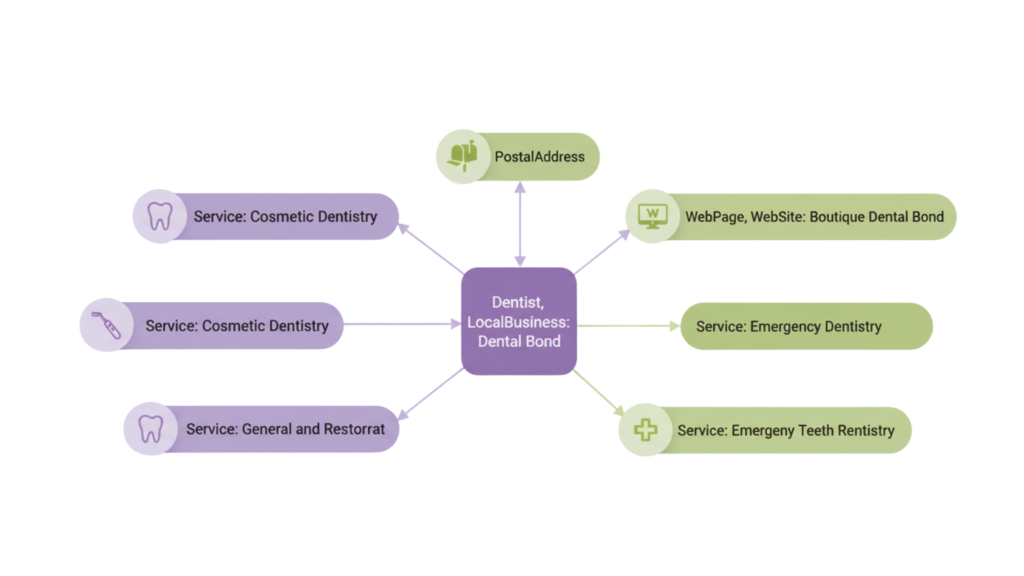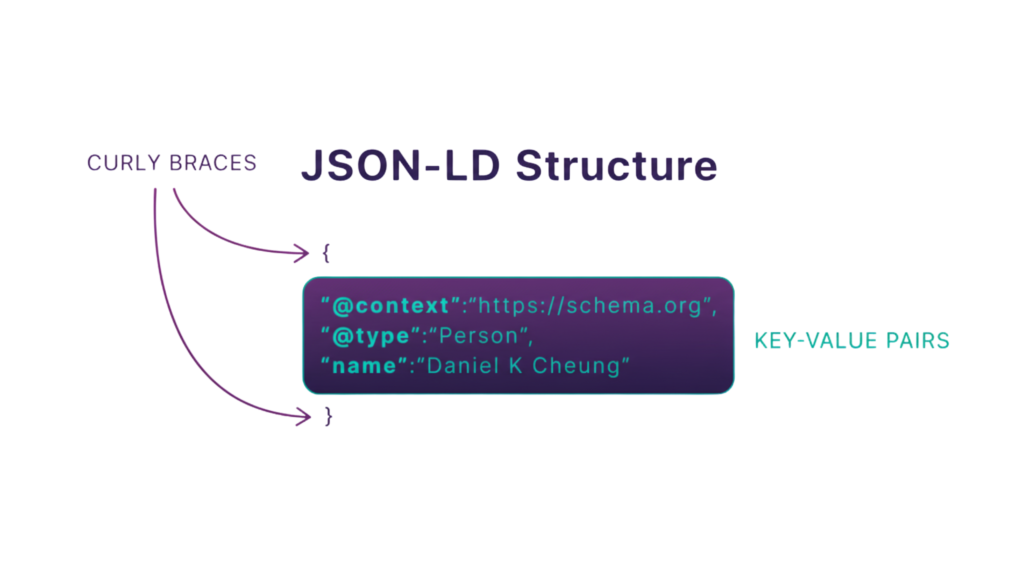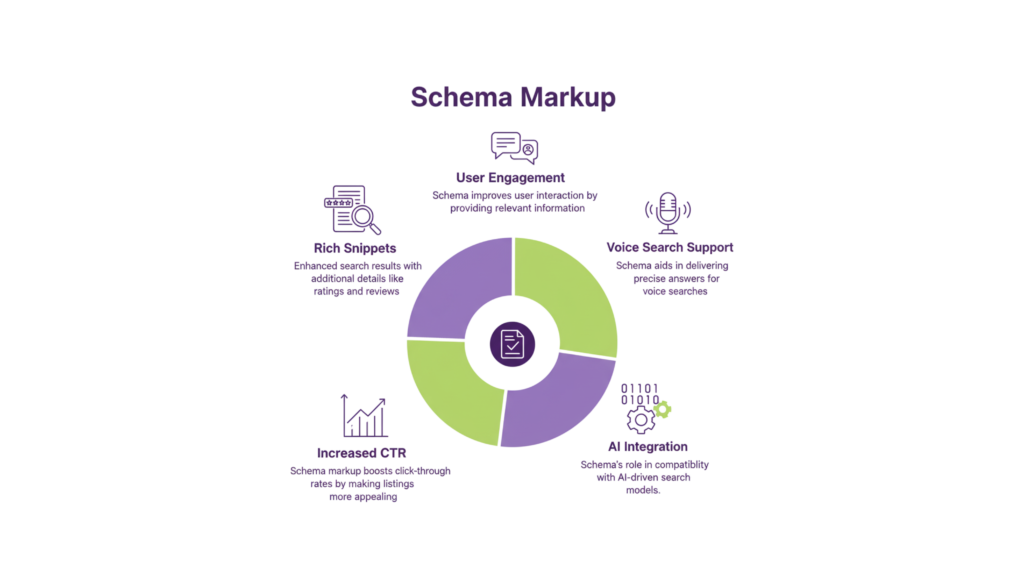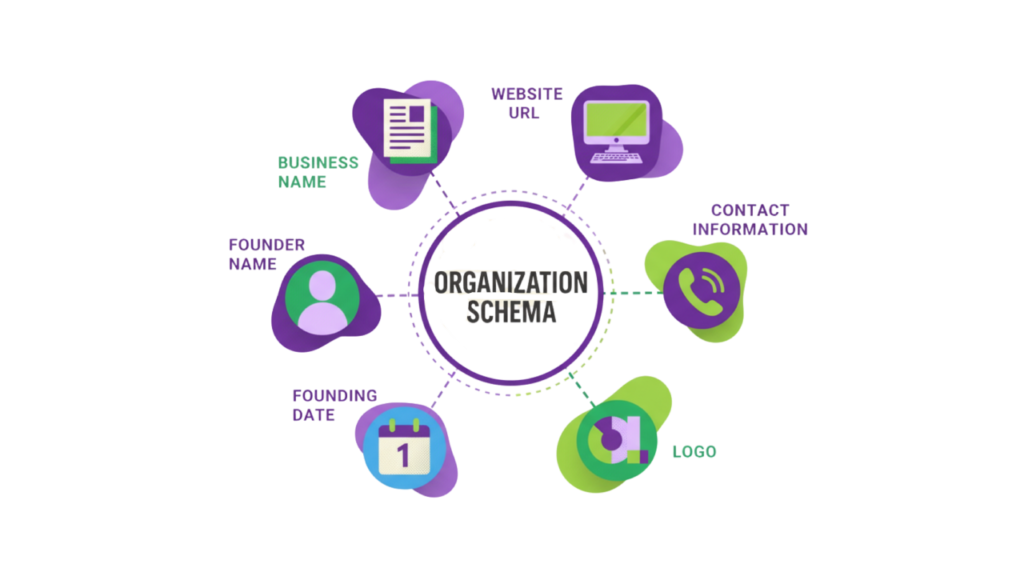Schema markup SEO leads to major increases in click-through rates for businesses. Schema App’s customers saw notable CTR improvements when rich results appeared in their January 2025 quarterly business reviews.
Schema.org markup has grown way beyond generating rich snippets in search results. LLMs grounded in knowledge graphs are 300% more accurate compared to those using only unstructured data. This shows structured data SEO’s expanding role in AI understanding and knowledge graph integration.
Search engines receive explicit signals about your content’s meaning and context when you add structured data to web pages. Schema markup isn’t a direct ranking factor. However, it improves how your content shows up in search results. This positions your business well in today’s AI-driven search world.
This piece explores how advanced schema strategy changes your online presence. You’ll learn the most effective schema types that drive results and practical ways to scale structured data across your business website.
Schema Markup Today: More Than Just Rich Snippets

Schema markup has grown by a lot since Google first introduced rich snippets in 2009. The goal was simple back then: search engines needed to understand web content better to improve search listings. These days, structured data offers much more than just better SERP appearances.
Structured Data SEO for Visibility and Context
Structured data acts as a specialized language between your website and search engines. This markup provides clear signals about your content’s meaning and context. Search engines can interpret your pages more accurately.
Your content’s meaning becomes crystal clear to Google with structured data instead of leaving room for guesswork. To cite an instance, a recipe page with structured data points out specific items like ingredients, cooking time, and nutritional information. This makes the data readily available.
Structured data has become vital to stand out in today’s competitive search landscape. SearchEngineLand states it’s no longer just nice to have – it’s a core part of any working SEO strategy.
Schema.org’s Role in Modern Search Engines
Schema.org’s creation in 2011 changed the game for search engines. This team effort between Google, Bing, Yahoo!, and Yandex created a shared vocabulary for structured data.

Schema.org now has hundreds of markup types, though Google supports 31 specific types for rich results. This standard approach means your content becomes easy to understand across all major search engines when you use schema markup correctly.
JSON-LD stands out as the best format to use, with Google’s official backing over other options like Microdata and RDFa. This JavaScript-based method keeps structured data separate from HTML. The code becomes easier to manage with fewer chances of errors.
CTR Improvements from Rich Snippets
Rich snippets pack a punch when it comes to click-through rates. Milestone Research shows rich snippets get a 58% average CTR compared to 41% for regular results. FAQ snippets perform even better with CTRs up to 87%.
Ground results prove these benefits:
- Rotten Tomatoes got 25% more clicks after using structured data on 100,000 pages
- Food Network saw 35% more visits after enabling search features on 80% of their pages
- Nestlé achieved an 82% higher CTR on pages with rich results
Schema Markup SEO Benefits in Zero-Click SERPs
Zero-click searches keep growing – 25.6% of desktop searches and 17.3% of mobile searches end without clicks. Schema markup’s value goes beyond just driving website traffic.
Zero-click searches still bring great value. Schema markup seo boosts your chances of showing up in AI Overviews, Featured Snippets, People Also Ask sections, and knowledge panels.

Structured data helps build your authority too. Search engines that understand your content better will show it as trusted information right in the SERPs. This visibility builds brand recognition and awareness – key factors in Google’s E-E-A-T framework for quality assessment.
Schema markup does more than just improve search listings for your business. It establishes your brand as a trusted source in our AI-driven search world.
Types of Schema That Still Drive Results

There are 797 types and 1,453 properties on Schema.org right now. Some implementations work better than others when it comes to real SEO results. Let’s get into the schema types that boost search visibility and user engagement by a lot.
Product and Review Schema for eCommerce
Product schema revolutionizes how your merchandise shows up in search results. This makes it the lifeblood of an eCommerce SEO strategy. Search engines can display key product details directly in SERPs when you use this markup:
- Product name, description, and brand
- Price and availability status
- Customer ratings and reviews
- Product images and variants
Companies using product schema see much better engagement. Nestlé found that pages with rich results had an 82% higher click-through rate compared to regular results. Product schema also enables features like price drop alerts, which Google figures out by tracking price history.
Review schema works with product markup to build trust. About 72% of shoppers wait to see positive reviews before buying anything, so this schema type directly affects sales. The proper way to use the review schema needs properties like author, reviewRating, and itemReviewed. Reviews must be on your site rather than pulled from other sources.
Event and Video Schema for Engagement
Event schema markup boosts visibility for all kinds of gatherings—from conferences to concerts to virtual webinars. Google can show complete event details in search results with this structured data, highlighting date, time, location, and ticket availability.
This schema works for regular in-person events, online meetings, and hybrid experiences. Eventbrite saw a 100% increase in yearly traffic from Google Search after using event schema.
Video schema tells search engines important details about video content they can’t crawl otherwise. The markup shows title, description, upload date, and thumbnail URL. Videos can then appear with thumbnails in search results, which helps get more clicks.
Organization and Local Business Schema for Branding
Organization schema helps search engines understand your business better, especially in Knowledge Graphs. The structured data shows your official name, logo, website URL, and social profiles.

Local business schema is vital for companies with physical locations. This markup shows:
- Business name and physical address
- Operating hours and phone numbers
- Services offered and business category
- Customer ratings and reviews
Local business schema helps you show up in Google’s Map Pack and local search results. Research shows 90% of consumers check online reviews before visiting businesses, which makes the review part of the local schema crucial.
Rankfast’s Schema Validator is a great way to get the most from these schema types. It helps catch errors before they hurt your search performance.
How Schema Supports AI and Knowledge Graphs

Schema markup goes way beyond the reach and influence of simple search result improvements. It now plays a vital role in how artificial intelligence understands web content. The structured data on your website creates a foundation for machine learning systems and knowledge graphs that power modern search experiences.
Using Schema to Build a Content Knowledge Graph
Your website’s connected schema markup builds your own content knowledge graph. Knowledge graphs define the meaning behind relationships and enable more nuanced insights, unlike traditional databases that just link data points. This change converts unstructured web content into structured, semantic data that search engines and enterprise AI tools can process effectively.
Schema.org vocabulary helps build a content knowledge graph through these steps:
- Identify key entities on your website (people, products, events)
- Use schema.org vocabulary to describe these entities
- Connect entities using appropriate properties
- Link entities to external knowledge bases like Wikipedia or Wikidata
This connected approach creates a strong semantic framework for your organization. Search engines understand your content’s context and meaning better, which improves your visibility in relevant searches.
Semantic Relationships for AI Accuracy
Schema markup’s strength lies in creating clear semantic relationships between entities. These connections help AI systems interpret and process information.

A study showed that large language models (LLMs) with knowledge graphs achieve 300% higher accuracy compared to those using unstructured data alone. Semantic relationships provide context that helps AI systems grasp content nuances, leading to this dramatic improvement.
Semantic relationships in schema offer practical benefits:
- AI assistants can locate specific elements on your site
- Recommendation systems suggest relevant content better
- Virtual assistants like Siri and Alexa extract precise answers
AI platforms like Perplexity, Claude, ChatGPT, and Gemini favor content with clear, structured data. This preference exists because they can extract relevant answers faster and more accurately.
Schema in Google’s Knowledge Graph and Gemini
Google enriches its Knowledge Graph by crawling the web and schema markup. The Knowledge Graph has millions of entries about ground entities like people, places, organizations, and events.
Organization schema on your homepage can influence visual elements like your Knowledge Panel. Google understands your organization better through properties such as founder, location, and logo, and stores this information in its Knowledge Graph.
Google owns approximately 89% of search traffic, and its Gemini leads the LLM/Generative AI race as of December 2024. This market dominance makes schema markup essential for businesses that want to control their content’s interpretation and presentation.
Note that Google’s Gemini uses schema-rich pages to refine its generative AI responses. This ensures alignment with precise and contextually relevant information. A detailed schema strategy positions your business better as AI revolutionizes search.
Implementing Schema at Scale for Your Business

Large websites face several challenges when they implement schema markup at scale. Businesses need reliable tools and strategies to avoid mistakes that could hurt their structured data SEO efforts.
Using Tools like AIOSEO and Rankfast Validator
AIOSEO’s powerful schema generation makes implementation easier on multiple pages. The platform’s next-gen Schema Generator has validation tools that check if your markup meets Google’s standards. Rankfast Schema Validator works alongside these tools and tests your structured data immediately to find errors before they hurt your search rankings. These solutions remove manual coding needs while keeping accuracy high.
Avoiding Common Schema Mistakes
Teams of all experience levels can make schema errors that lead to Google penalties:
- Markup on content that users cannot see
- Wrong application of page-specific markup across the site
- Using fake reviews instead of customer feedback
- Showing individual ratings when averages are needed
Schema testing tools can catch these problems early, before they reduce your search visibility.
Custom Schema for Complex Content Structures
Custom schema gives you more options than standard implementations for special content types. AIOSEO’s Custom Schema tool lets you add JSON-LD markup right in WordPress. This method works well with complex websites that have special information structures. You can create schema templates that reduce the time spent on similar markup across pages.
Why Choose Rankfast for Schema Strategy
Companies now see structured data as a competitive edge, and picking the right implementation partner is significant. Rankfast distinguishes itself as a specialized provider of schema markup solutions that go beyond simple implementation.
Advanced Schema Strategy for B2B SEO
Rankfast creates schema markup seo strategies that work perfectly for B2B businesses. Their comprehensive method addresses the unique challenges B2B companies face in industries with limited search volume. Your B2B website can gain better visibility even in niche markets through strategic schema markup seo implementation. Look at this: 72.6% of pages appearing on Google’s first page use schema. This makes proper implementation necessary for success.
Schema Validator for Real-Time Testing
Rankfast’s Schema Validator lets you check your structured data implementation right away. The tool spots errors or warnings in your markup syntax and suggests specific fixes. You just need to enter your URL and click “Validate Schema” to get applicable information. This helps you make sure your structured data works perfectly before launch.
Ongoing Support for AI-Ready Data Architecture
Rankfast prepares your website to handle the AI-driven future of search effectively. They build data structures that AI systems understand easily. This prevents potential “hallucinations” or misrepresentations of your brand. Their forward-looking approach will give you a schema implementation that stays relevant as search technologies move toward greater AI integration.
Conclusion
Schema markup SEO is a big deal, as it means that it goes beyond its original role in generating rich snippets. You’ve learned how structured data creates clear signals about your content’s meaning and context. These signals help search engines interpret your pages accurately. The advantages go way beyond simple SERP improvements – schema markup and knowledge graph integration are the foundations of AI understanding.
Let’s look at how specific schema types deliver measurable results consistently. Product and review schema reshapes eCommerce visibility and delivers up to 82% higher click-through rates. Event and video schema boost participation rates, while organization and local business schema strengthen your brand’s presence in knowledge panels and local search results.
Are you ready to implement schema markup at scale? Note that proper execution needs careful planning and continuous validation. Tools like the Rankfast Schema Validator help spot errors before they hurt your search performance. Custom schema implementations offer flexibility while maintaining accuracy for businesses with complex content structures.
Websites that communicate clearly with both search engines and AI systems will own the future of search. Detailed schema markup implementation today positions your business for success as search technology evolves.
Check your current implementation with Rankfast’s Schema Validator or explore how a customized schema strategy can reshape your digital presence.
FAQs
Q1. How does schema markup impact SEO in 2025?
Schema markup significantly enhances SEO by providing search engines with explicit signals about content meaning and context. While not a direct ranking factor, it improves content visibility in search results and prepares websites for AI-driven search, potentially leading to higher click-through rates and engagement.
Q2. What are the most effective types of schema markup for businesses?
The most effective schema types include Product and Review schema for eCommerce (increasing CTR by up to 82%), Event and Video schema for boosting engagement, and Organization and Local Business schema for enhancing brand presence in knowledge panels and local search results.
Q3. How does schema markup support AI and knowledge graphs?
Schema markup creates a semantic framework that AI systems can easily interpret, leading to 300% higher accuracy in AI understanding compared to unstructured data. It helps build content knowledge graphs, establishes clear semantic relationships, and enriches platforms like Google’s Knowledge Graph and Gemini AI.
Q4. What tools can help implement schema markup at scale?
Tools like AIOSEO’s Schema Generator and Rankfast’s Schema Validator are valuable for implementing and testing schema markup across large websites. These tools simplify the process, ensure accuracy, and help identify errors before they impact search performance.
Q5. Why is a custom schema important for complex websites?
Custom schema provides flexibility for unique content types and complex information architectures. It allows businesses to create tailored schema templates that accurately represent their specific content structure, saving time and ensuring proper implementation across multiple pages.

Leave a Reply